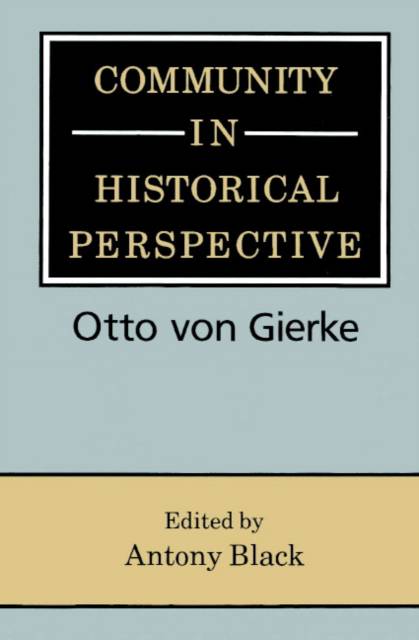
- Afhalen na 1 uur in een winkel met voorraad
- Gratis thuislevering in België vanaf € 30
- Ruim aanbod met 7 miljoen producten
- Afhalen na 1 uur in een winkel met voorraad
- Gratis thuislevering in België vanaf € 30
- Ruim aanbod met 7 miljoen producten
Zoeken
Omschrijving
This is the first English translation of the first work of Otto von Gierke, arguably the greatest historian of ideas of the nineteenth century. Community in Historical Perspective includes much of the first volume of Das Deutsche Genossenschaftsrecht, originally published in 1868, and the texts translated here have become essential reading for anyone interested not only in the history of ideas and alternatives to conventional socialism and liberalism, but also, as recent experience has shown, contemporary European affairs. Von Gierke's represented an unparalleled attempt to justify a political programme of structural pluralism, and to interpret the entire course of European history from the Dark Ages onwards as a progressive interaction between 'fellowship' (or 'comradeship') and 'lordship' (or 'sovereignty'). This interaction was to generate a polity of autonomous associations within a constitutional state based upon consent and federal unity, and von Gierke here laid the basis for a distinctively Germanic programme of federalism and quasi-pluralism, with a strongly nationalist emphasis upon the unique capacity of Germans, despite long periods of absolute rule, for corporate self-management.
Specificaties
Betrokkenen
- Auteur(s):
- Uitgeverij:
Inhoud
- Aantal bladzijden:
- 308
- Taal:
- Engels
Eigenschappen
- Productcode (EAN):
- 9780521893237
- Verschijningsdatum:
- 2/05/2002
- Uitvoering:
- Paperback
- Formaat:
- Trade paperback (VS)
- Afmetingen:
- 156 mm x 228 mm
- Gewicht:
- 476 g

Alleen bij Standaard Boekhandel
+ 184 punten op je klantenkaart van Standaard Boekhandel
Beoordelingen
We publiceren alleen reviews die voldoen aan de voorwaarden voor reviews. Bekijk onze voorwaarden voor reviews.











